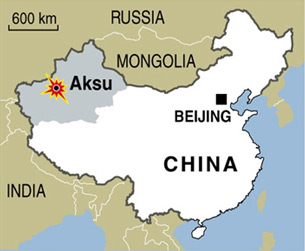China’s violence-prone Xinjiang Uighur Autonomous Region has been hit by another knife attack, this time at a coal mine. Many people have died, but the numbers have not been confirmed. Up to 40 people have been injured.
Citing local police, the knife attack began at around 3am last Friday at the Sogan colliery in Aksu Prefecture, Bay County. An official notice distributed to police and quoted by Radio Free Asia called the incident “a long-planned, well-prepared, large-scale attack by separatists against police officers and mine owners at a coal field in our county.”
Jamal Eysa, the chief of state security police at a neighboring mine in Bay County, said police officers involved in dealing with the attackers told him the suspects were from “neighboring farms” and that they had “taken control of the dynamite at the colliery.”
“That is why they were able to do such severe damage to our police team and to the Han businessman and factory owners,” said Eysa, though he did not elaborate if the explosives were used in the attack. Security guard Zhang Jianjie gave a second-hand account of the attack. “According to my boss, the attackers called the Terek police station to report the incident, and when police officers approached the mine area, the group used trucks filled with coal to ram the police van and then assaulted the injured officers with knives,” Zhang said.
“I know that five of 10 police officers were killed at the scene and the rest of them were transferred to the hospital in Bay county, but I don’t know how many of the attackers were killed or injured,” he said.
Zhang said police authorities are currently patrolling the vicinity in force. “The current situation in Bay county indicates that at least some of the attackers are alive and were able to escape.”
Bay township resident Li Ming told Radio Free Asia that by Monday afternoon, security checkpoints had been established at all intersections throughout town, while armed police squads were patrolling the area in armored personnel carriers, leading him to believe that the “incident was much more severe than I had thought and the suspects have still not been killed or captured.”
While Li could confirm that something had happened at “the coal mining field in Terek township”, he was not willing to continue to talk to a foreign reporter.
“I have no right to give you information and I have to record your contact information to give to the county police department,” said Li. “I can only answer your questions if the department notifies me that I may accept your interview.”
Channel News Asia reported that repeated calls to the Xinjiang government and public security departments were not answered, saying that violent incidents are not confirmed by Chinese authorities, if ever.
In June, Radio Free Asia said at least 18 people died when ethnic Uighurs attacked police with knives and bombs at a traffic checkpoint in the old Silk Road city of Kashgar, an incident that has not been confirmed by the Chinese government.

Aksu has experienced previous incidents of mass violence.
This past February, a hacking and shooting incident left 17 dead in Aksu. In 2014, six people were shot by police and another six killed by explosions after a bomb went off near a hair salon. In 2010, a Uighur man is reported to have thrown a bomb that killed seven people and injured another 14.
Tensions between ethnic Uighurs that call Xinjiang home and the majority Han have resulted in repeated acts of violence that have killed hundreds of people. Beijing blames Muslim separatists, while exiled Uighur groups and human rights organizations say repressive policies are to blame for provoking unrest.

